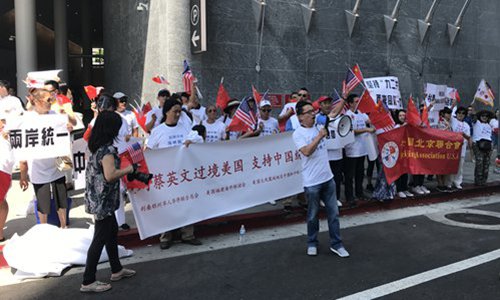HOME >> CHINA
Tsai blaming mainland for poor performance 'absurd,' experts say
By Sun Haoran Source:Global Times Published: 2019/10/10 23:58:40

Chinese demonstrators sing songs and chant slogans while waiting for the arrival of Taiwan leader Tsai Ing-wen in Los Angeles in August 2018. As Tsai arrived at the Intercontinental Hotel, she was greeted by peaceful Chinese demonstrators of all ages and from all walks of life. They were holding flags, banners and signs bearing the slogan "One China." The crowd began chanting "One China!" and "Oppose Taiwan Independence!" as Tsai pulled into the hotel. Photo: Wang Rujun
Taiwan leader Tsai Ing-wen made a speech at the Double Tenth Day commemoration on Thursday, which was slammed by experts as being full of separatist absurdity and hostile thinking against the Chinese mainland, which will only bring instability and confrontation.
Thursday marks the 108th anniversary of the Chinese Revolution of October 10, 1911, which is also a holiday celebrated widely in the island.
Tsai said that "China" still "threatens" Taiwan with the "one country, two systems" principle, which will be rejected by the 23 million Taiwan residents, and the island will have no room for survival if it accepts it, according to a report by the office of the Taiwan regional government on Thursday.
"Her speech is obviously isolated and absurd," Peng Guangqian, a strategic studies expert at the Academy of Military Sciences and a consultant on the Taiwan question, told the Global Times on Thursday.
"Taiwan is a part of China and not a sovereign state," said Peng. "Taiwan independence is not recognized by most countries in the world and is not in line with international law," Peng said.
"The 'one country, two systems' principle accords with the island's political system, economic conditions and level of development," Peng noted, adding that the Taiwan authorities simply cannot represent the 23 million Taiwan people.
Tsai claimed that "China" uses "sharp power" to come after Taiwan step by step, and Taiwan will unite countries that share its values to ensure the status quo of peace and stability is not changed unilaterally. Peng said this was typical of remarks from Tsai, who blames the Chinese mainland for her own poor performance in office.
"Tsai has denied the 1992 consensus and kept pursuing Taiwan separatism after she took office in 2016," Peng said. "It is obvious that Tsai is the one who has broken the status quo across the Taiwan Straits and, of course, the Chinese mainland must adopt resolute counter-measures."
"Because of Tsai's antagonist stance, Taiwan's international space has been continuously shrinking, and there are only 15 countries that still share 'diplomatic ties' with the island, which is the lowest in history," Peng noted. "No external force is able or willing to help Taiwan independence."
Tsai also mentioned that the current government has worked hard to adjust the economic structure and promote international multi-distribution in the past three years, as well as striving to maintain social equity, raising wages, and providing comprehensive care so that people can share the fruits of economic growth.
"This is totally the opposite of the facts," Xu Xue, a professor on Taiwan issues with the Institute of Taiwan at Xiamen University, told the Global Times on Thursday.
"Instead of uniting different parties on the Island, Tsai has intensified conflicts and split Taiwan society since 2016," said Xu.
"Taiwan is the biggest beneficiary of cross-straits ties and will suffer the most if the relations keep deteriorating" Xu said, taking the tourism industry as an example.
According to statistics from the Taiwan authorities, the average daily number of tourists from the Chinese mainland visiting Taiwan during the Golden Week in October was only 3,000, a decrease of two-thirds compared to the previous year, China Central Television reported on Wednesday.
According to China's Ministry of Commerce, the trade volume between the mainland and the island of Taiwan was $226.24 billion and the trade surplus reached $129 billion on the Taiwan side in 2018, making the mainland Taiwan's largest trading partner and source of trade surplus.
Posted in: SOCIETY,HK/MACAO/TAIWAN